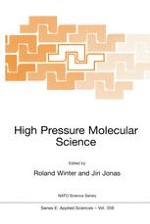1999 | OriginalPaper | Chapter
Critical- and Wetting-Phenomena Near the Liquid-Vapour Critical Point of Metals
Author : F. Hensel
Published in: High Pressure Molecular Science
Publisher: Springer Netherlands
Included in: Professional Book Archive
Activate our intelligent search to find suitable subject content or patents.
Select sections of text to find matching patents with Artificial Intelligence. powered by
Select sections of text to find additional relevant content using AI-assisted search. powered by
Our understanding of the liquid-vapour equilibrium in metallic systems has increased enormously in the past two decades. Much of this has been stimulated by a series of pioneering papers of Mott [1] on the metal-non-metal transition which shows up when a liquid metal is heated to the region of the liquid-vapour critical point. The existence of this transition implies that the liquid-vapour phase transition of fluid metals is distinct from that of normal insulating fluids such as inert gases. An inert-gas atom retains its identity in the condensed phase and the pair potential which determines the properties of the dilute vapour phase is supplemented to a limited degree by many-body interactions, in the total potential energy of the dense phase [2]. In contrast, the electronic structures of the two coexisting phases, liquid and vapour, of fluid metals may be vastly different. The essntial point is that the metallic state is a collective phenomenon existing only when the density of atoms is sufficiently large. Unlike inert gases the electronic stucture in the high-density liquid is very different from that of an atom in the dilute vapour.
